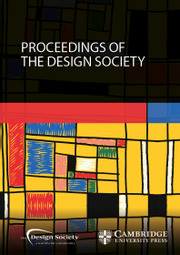Article contents
COMPARING ACADEMICS AND PRACTITIONERS Q & A TUTORING IN THE ENGINEERING DESIGN STUDIO
Published online by Cambridge University Press: 19 June 2023
Abstract
In the design studio, academic (professor) and practitioner tutors provide individual mentoring to students as they progress in their design projects. Prior studies suggest that design practitioners may follow a different design process compared to academics, but little is known about how this difference relates to their design tutoring. This study explores the similarities and differences in tutoring by academics and practitioners. We use a question-asking lens to characterize the tutoring styles of four tutors - two academics and two practitioners - over a five-week design project in an engineering design studio. We find that academic tutors ask questions at a significantly higher rate than practitioner tutors, suggesting a more question-centred tutoring style. We also find that proportionally more of practitioner tutors’ questions are generative in nature, while the academic tutors employ more convergent thinking in their questioning. This may be an indicator of the practitioners' own design thinking, which might be more solution-focused than that of academics. These preliminary findings motivate future investigations of the relationship between differences in tutoring and impact on student design learning.
- Type
- Article
- Information
- Creative Commons
- This is an Open Access article, distributed under the terms of the Creative Commons Attribution-NonCommercial-NoDerivatives licence (http://creativecommons.org/licenses/by-nc-nd/4.0/), which permits non-commercial re-use, distribution, and reproduction in any medium, provided the original work is unaltered and is properly cited. The written permission of Cambridge University Press must be obtained for commercial re-use or in order to create a derivative work.
- Copyright
- The Author(s), 2023. Published by Cambridge University Press
References
- 1
- Cited by


